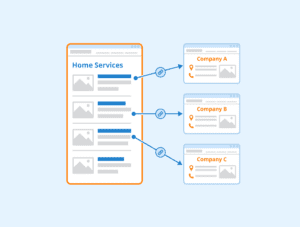 In the ever-evolving domain of local SEO, the significance of citations remains unwavering, serving as vital markers of a business’s digital presence. However, amidst the dynamic landscape of search algorithms and user behavior, understanding the nuanced role of citations in 2024 requires a keen eye for adaptation. Beyond the conventional wisdom, we dive into unexplored facets, shedding light on the symbiotic relationship between citations and local search rankings. Uncovering lesser-discussed strategies and insights, we aim to equip seasoned SEO professionals with the tools to navigate the intricacies of citation optimization in the contemporary digital marketplace.
In the ever-evolving domain of local SEO, the significance of citations remains unwavering, serving as vital markers of a business’s digital presence. However, amidst the dynamic landscape of search algorithms and user behavior, understanding the nuanced role of citations in 2024 requires a keen eye for adaptation. Beyond the conventional wisdom, we dive into unexplored facets, shedding light on the symbiotic relationship between citations and local search rankings. Uncovering lesser-discussed strategies and insights, we aim to equip seasoned SEO professionals with the tools to navigate the intricacies of citation optimization in the contemporary digital marketplace.
Are Citations Still Important in 2024?
In the fast-paced world of Local SEO, the relevance of citations remains a subject of scrutiny and debate. However, for seasoned professionals deeply entrenched in the nuances of search engine optimization, the answer lies not in absolutes. Instead, it resides in a nuanced understanding of contextual relevance and user intent.
Evolving Algorithms: While some may argue that the importance of citations has waned in the face of algorithmic updates, a closer examination reveals a more intricate narrative. Algorithmic shifts often prioritize user experience and context, leading to fluctuations in the perceived significance of citations.
User Engagement Signals: Beyond mere mentions, citations serve as valuable signals of trust and authority to both search engines and potential customers. In an era where user engagement metrics reign supreme, the presence and consistency of citations can significantly impact local search rankings.
Contextual Relevance: The role of citations extends beyond mere visibility, encompassing elements of context and relevance. As search algorithms grow increasing
ly sophisticated, the contextual relevance of citations to a business’s industry, location, and target audience becomes paramount.
By learning the nuanced interplay between citations, algorithmic updates, and user behavior, we aim to equip SEO professionals with the insights needed to navigate the complex landscape of local search optimization in 2024.
Essential Citations for Local SEO
In the intricate ecosystem of local SEO, identifying and securing essential citations is akin to laying down the foundation for digital visibility and success. For seasoned professionals immersed in the art of optimization, understanding the nuanced landscape of citation sources is paramount in driving tangible results for businesses.
Major Data Aggregators: These powerhouses of data dissemination, including platforms like Google My Business, Yelp, and Bing Places, are essential in the local SEO ecosystem. Ensuring consistent and accurate information across these platforms is essential for establishing credibility and trust with both search engines and consumers.
Niche Directories: While major data aggregators garner significant attention, niche directories tailored to specific industries wield considerable influence in local search rankings. Identifying and securing citations from relevant niche directories not only enhances visibility but also signals industry expertise and authority.

Local Business Directories: Platforms such as Yelp, Yellow Pages, and TripAdvisor continue to hold sway in local search, acting as go-to resources for
consumers seeking local businesses. Optimizing profiles on these directories, complete with compelling descriptions and high-quality media, can significantly enhance engagement and conversion rates.
By meticulously curating citations from these essential sources, SEO professionals
can amplify the digital footprint of businesses, driving organic traffic and fostering long-term growth in the competitive landscape of local SEO.
The Importance of Name, Address, and Phone Number (NAP) Accuracy
In the intricate dance of local SEO, the trifecta of Name, Address, and Phone Number (NAP) accuracy emerges as a silent yet powerful determinant of digital visibility and credibility. Beyond the conventional wisdom of consistency, delving deeper into the nuances of NAP accuracy unveils untapped opportunities for SEO professionals to elevate their strategies and drive tangible results for their clients.
Semantic Variations: While consistency in NAP details across online platforms is often emphasized, overlooking semantic variations can lead to missed opportunities for optimization. Understanding and leveraging variations in business names, addresses, and phone numbers based on user intent and search context can enhance visibility and relevance in local search results.
Localized Keyword Integration: Beyond mere mentions, strategically integrating localized keywords within NAP details can amplify the relevance and authority of businesses within their target markets. By aligning NAP information with localized search queries, SEO professionals can unlock new avenues for organic traffic and engagement.
Structured Data Markup: Harnessing the power of structured data markup, such as Schema.org, to encode NAP information can facilitate enhanced visibility and rich snippets in search results. By providing search engines with structured data, SEO professionals can streamline the indexing process and enhance the prominence of NAP details in search listings.
By embracing a nuanced approach to NAP accuracy, SEO professionals can transcend traditional optimization tactics and unlock new dimensions of digital visibility and success for their clients in the competitive landscape of local SEO.
Best Practices for Maintaining Accurate NAP Data
In the ever-evolving landscape of local SEO, the quest for maintaining accurate Name, Address, and Phone Number (NAP) data transcends mere consistency, encompassing a multifaceted approach rooted in proactive optimization and strategic foresight. For seasoned professionals committed to driving tangible results for their clients, adopting innovative best practices for NAP data management is essential in navigating the complexities of the digital marketplace.
Dynamic NAP Monitoring: Beyond periodic audits, implementing dynamic NAP monitoring systems powered by AI and machine learning algorithms can provide real-time insights into discrepancies and variations across online platforms. By staying ahead of potential inaccuracies, SEO professionals can mitigate the risk of negative impacts on local search rankings.
Geospatial Analysis: Leveraging geospatial analysis tools and techniques, such as heat mapping and geocoding, can uncover hidden patterns and opportunities for optimizing NAP data based on localized search behavior and demographic trends. By aligning NAP information with the spatial context of user intent, SEO professionals can enhance relevance and engagement in local search results.
Cross-Platform Synchronization: Embracing cross-platform synchronization solutions, such as API integrations and data syndication services, can streamline the process of updating and maintaining NAP data across diverse online platforms. By centralizing NAP management efforts, SEO professionals can ensure consistency and accuracy while minimizing resource expenditure.
By embracing innovative best practices for maintaining accurate NAP data, SEO professionals can position their clients for sustained success in the competitive arena of local SEO, driving organic traffic, engagement, and conversion rates with precision and efficacy.
As we navigate the dynamic landscape of local SEO in 2024, the enduring significance of citations and Name, Address, and Phone Number (NAP) accuracy emerges as pillars of digital visibility and credibility for businesses. For seasoned professionals dedicated to driving tangible results in the ever-evolving realm of search engine optimization, the insights gleaned from this exploration serve as guideposts in the pursuit of excellence and innovation.
In the face of algorithmic shifts and user behavior trends, the importance of citations remains steadfast, serving as vital signals of trust and authority to both search engines and consumers. By curating citations from essential sources and embracing strategic optimization tactics, SEO professionals can amplify the digital footprint of businesses, driving organic traffic and fostering long-term growth in the competitive landscape of local SEO.
Moreover, the nuanced approach to NAP accuracy unveiled in this discourse underscores the importance of proactive optimization and strategic foresight in maintaining relevance and credibility in local search results. By adopting innovative best practices for NAP data management, SEO professionals can position their clients for sustained success, driving organic traffic, engagement, and conversion rates with precision and efficacy.
